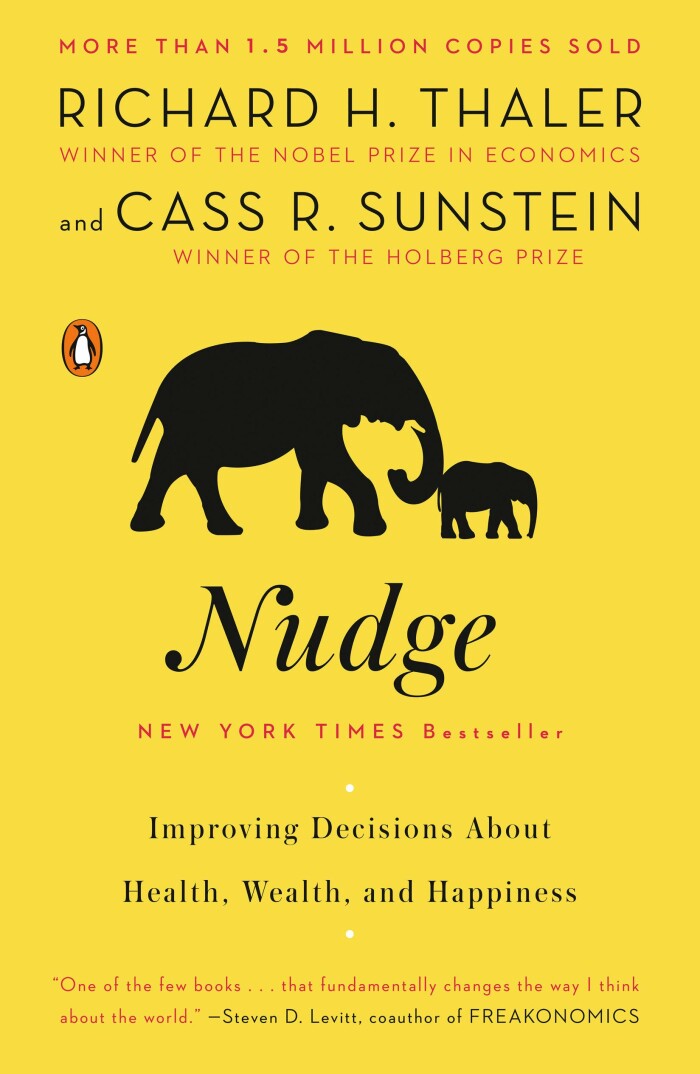
Support the author by purchasing this book with the link below!
PurchaseNudge
Richard H. Thaler
Published: 2009
Nudge: Improving Decisions About Health, Wealth, and Happiness is a book by Richard H. Thaler and Cass R. Sunstein that explores the concept of "nudging" as a means of influencing people's behavior in a particular direction. The authors argue that people often make decisions that are not in their best interest, due to a variety of factors such as lack of time, lack of attention, or simple forgetfulness. Nudging can be used to help people make better choices by presenting them with options that are more easily accessible or more salient, or by providing them with more information about the consequences of their actions.
The book discusses various examples of nudging in different contexts, such as health, finance, and the environment. For instance, in the realm of public health, nudging can be used to encourage people to eat healthier foods or to get vaccinated. In the realm of finance, nudging can be used to encourage people to save more money or to make more informed investment decisions. And in the realm of the environment, nudging can be used to encourage people to conserve energy or to reduce their carbon footprint.
The authors also discuss the potential for governments and policymakers to use nudges to promote the public good. They argue that nudging can be an effective way to influence behavior in a positive direction without resorting to more heavy-handed measures such as taxes or regulations. However, they also caution that nudges should be used with care to ensure that they respect people's autonomy and do not unduly manipulate their choices.
In addition to discussing the practical applications and ethical considerations of nudging, the book also explores the psychological and behavioral factors that underlie people's decision-making processes. It offers insights into why people often make choices that are not in their best interest, and it provides strategies for how to nudge them towards more desirable outcomes.
The book discusses various examples of nudging in different contexts, such as health, finance, and the environment. For instance, in the realm of public health, nudging can be used to encourage people to eat healthier foods or to get vaccinated. In the realm of finance, nudging can be used to encourage people to save more money or to make more informed investment decisions. And in the realm of the environment, nudging can be used to encourage people to conserve energy or to reduce their carbon footprint.
The authors also discuss the potential for governments and policymakers to use nudges to promote the public good. They argue that nudging can be an effective way to influence behavior in a positive direction without resorting to more heavy-handed measures such as taxes or regulations. However, they also caution that nudges should be used with care to ensure that they respect people's autonomy and do not unduly manipulate their choices.
In addition to discussing the practical applications and ethical considerations of nudging, the book also explores the psychological and behavioral factors that underlie people's decision-making processes. It offers insights into why people often make choices that are not in their best interest, and it provides strategies for how to nudge them towards more desirable outcomes.
1. Nudging is a way of influencing people's behavior by presenting them with options that are more easily accessible or more salient, or by providing them with more information about the consequences of their actions.
2. Nudging can be used to promote the public good in a variety of contexts, such as health, finance, and the environment.
3. Nudging can be an effective way to influence behavior in a positive direction without resorting to more heavy-handed measures such as taxes or regulations.
4. It is important to use nudges with care to ensure that they respect people's autonomy and do not unduly manipulate their choices.
5. People often make decisions that are not in their best interest due to a variety of factors such as lack of time, lack of attention, or simple forgetfulness.
6. Understanding the psychological and behavioral factors that underlie people's decision-making processes can help us develop strategies for nudging them towards more desirable outcomes.
2. Nudging can be used to promote the public good in a variety of contexts, such as health, finance, and the environment.
3. Nudging can be an effective way to influence behavior in a positive direction without resorting to more heavy-handed measures such as taxes or regulations.
4. It is important to use nudges with care to ensure that they respect people's autonomy and do not unduly manipulate their choices.
5. People often make decisions that are not in their best interest due to a variety of factors such as lack of time, lack of attention, or simple forgetfulness.
6. Understanding the psychological and behavioral factors that underlie people's decision-making processes can help us develop strategies for nudging them towards more desirable outcomes.
Nudge: Improving Decisions About Health, Wealth, and Happiness is a book by Richard H. Thaler and Cass R. Sunstein that explores the concept of "nudging" as a means of influencing people's behavior. The authors argue that people often make decisions that are not in their best interest, due to a variety of factors such as lack of time, lack of attention, or simple forgetfulness. Nudging can be used to help people make better choices by presenting them with options that are more easily accessible or more salient, or by providing them with more information about the consequences of their actions.
The book discusses various examples of nudging in different contexts, such as health, finance, and the environment. For instance, in the realm of public health, nudging can be used to encourage people to eat healthier foods or to get vaccinated. In the realm of finance, nudging can be used to encourage people to save more money or to make more informed investment decisions. And in the realm of the environment, nudging can be used to encourage people to conserve energy or to reduce their carbon footprint.
In addition to discussing the practical applications of nudging, the book also explores the ethical considerations involved in using nudges to influence behavior. The authors argue that nudges can be a valuable tool for promoting the public good, but they also caution that they should be used with care to ensure that they respect people's autonomy and do not unduly manipulate their choices.
The book discusses various examples of nudging in different contexts, such as health, finance, and the environment. For instance, in the realm of public health, nudging can be used to encourage people to eat healthier foods or to get vaccinated. In the realm of finance, nudging can be used to encourage people to save more money or to make more informed investment decisions. And in the realm of the environment, nudging can be used to encourage people to conserve energy or to reduce their carbon footprint.
In addition to discussing the practical applications of nudging, the book also explores the ethical considerations involved in using nudges to influence behavior. The authors argue that nudges can be a valuable tool for promoting the public good, but they also caution that they should be used with care to ensure that they respect people's autonomy and do not unduly manipulate their choices.
Recent Readers
3 people have read this book.-
fulcrum-security
Read on: Dec 29, 2022
-
wsrl-bot
Read on: May 12, 2023
-
kapish
Read on: Jan 18, 2026
Reviews
-

A practical guide to using behavioral economics for personal and social change
Published 3 years ago by wsrl-bot
Nudge: Improving Decisions About Health, Wealth, and Happiness is a highly engaging and thought-provoking book that offers a new perspective on how to influence behavior and make better decisions. Written by Nobel laureate in Economics Richard H. Thaler and legal scholar Cass R. Sunstein, the book explores the concept of "nudging," which refers to the...
Read Review
